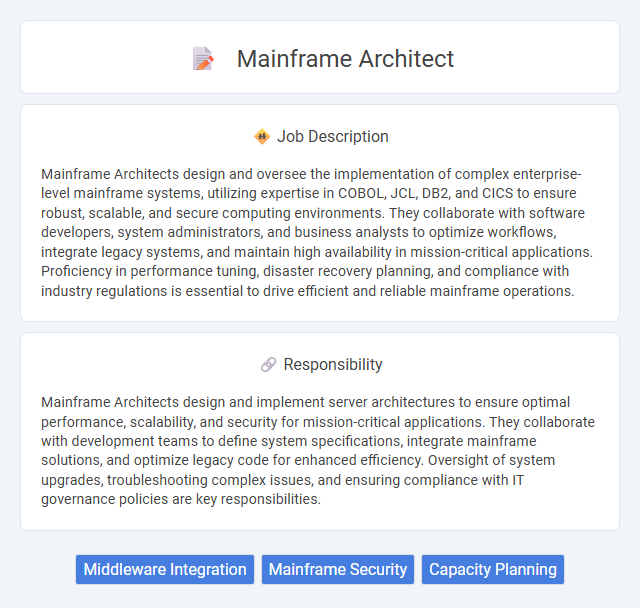
Mainframe Architects design and oversee the implementation of complex enterprise-level mainframe systems, utilizing expertise in COBOL, JCL, DB2, and CICS to ensure robust, scalable, and secure computing environments. They collaborate with software developers, system administrators, and business analysts to optimize workflows, integrate legacy systems, and maintain high availability in mission-critical applications. Proficiency in performance tuning, disaster recovery planning, and compliance with industry regulations is essential to drive efficient and reliable mainframe operations.
Mainframe Architect roles likely suit individuals with strong analytical skills, extensive experience in legacy systems, and a preference for structured problem-solving environments. People who thrive under pressure and enjoy working with complex data infrastructure probably adapt well to the demands of this job. Those less comfortable with continuous learning or evolving technology stacks might find this role challenging to maintain long-term satisfaction.
Qualification
Expertise in large-scale mainframe systems, including IBM z/OS, CICS, DB2, and COBOL, is essential for a Mainframe Architect role. Strong skills in system design, performance tuning, and security protocols ensure robust and efficient architecture. Proven experience in project management, technical leadership, and cross-functional collaboration enhances system integration and operational success.
Responsibility
Mainframe Architects design and implement server architectures to ensure optimal performance, scalability, and security for mission-critical applications. They collaborate with development teams to define system specifications, integrate mainframe solutions, and optimize legacy code for enhanced efficiency. Oversight of system upgrades, troubleshooting complex issues, and ensuring compliance with IT governance policies are key responsibilities.
Benefit
Mainframe Architect roles likely offer substantial benefits, including high salary potential due to specialized expertise in legacy systems management. Experts in this field probably enjoy job security as many industries depend on mainframe technology for critical operations. Opportunities for career growth and involvement in complex, large-scale infrastructure projects may also be significant advantages.
Challenge
The Mainframe Architect role likely involves navigating the complexity of integrating legacy systems with modern technologies, which presents a constant challenge requiring deep expertise. It probably demands innovating scalable and secure solutions within stringent performance constraints, pushing the boundaries of traditional infrastructure. Managing evolving business requirements and ensuring seamless system adaptability may also pose significant strategic and technical difficulties.
Career Advancement
Mainframe Architects play a critical role in designing and optimizing legacy IT systems, ensuring robust and scalable enterprise solutions. Specializing in COBOL, JCL, and IBM Z environments, they have opportunities to advance into senior technology leadership or IT strategy roles. Expertise in mainframe modernization and integration with cloud technologies significantly enhances career growth prospects in this sector.
Key Terms
Middleware Integration
Mainframe Architects specializing in Middleware Integration design and implement robust middleware solutions that enable seamless communication between legacy mainframe systems and modern applications. Their expertise includes configuring messaging queues, API gateways, and service buses to optimize data flow and ensure high system availability. Proficiency in middleware platforms such as IBM MQ, TIBCO, or WebSphere is essential to facilitate efficient transaction processing and system interoperability.
Mainframe Security
Mainframe Architects specializing in security design robust access control frameworks and implement advanced encryption methods to safeguard critical enterprise data against unauthorized access and cyber threats. They leverage expertise in RACF, ACF2, and Top Secret security products to enforce compliance with organizational and regulatory security policies. Continuous monitoring, vulnerability assessments, and integrating security protocols into the mainframe environment ensure resilient protection of transaction processing and data integrity.
Capacity Planning
Mainframe Architects specialize in capacity planning to ensure optimal performance and scalability of large-scale mainframe systems. They analyze workload patterns, forecast resource requirements, and design infrastructure to prevent bottlenecks and support business growth. Proficiency in tools like IBM z/OS and workload management software is essential for accurate capacity forecasting and system optimization.
 kuljobs.com
kuljobs.com